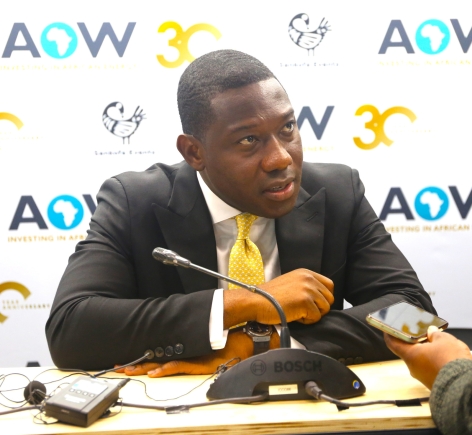
South Africa: Krapa woos investors to Ghana’s oil and gas industry
The Minister of State at the Ministry of Energy, Mr Herbert Krapa, has called on global investors in the oil and gas industry to take advantage of the country’s safe investment climate, robust democracy, and stable environment to invest in its oil and gas sector.
Speaking at the official opening of the 30th Africa Oil Week (AOW) in Cape Town, Mr. Krapa assured potential investors that Ghana’s oil and gas resources are ripe for exploration, production, and investment.
“And I believe that investing to bring out the resources under the ground would be worth the investment. I invite everyone here to Ghana to explore and take advantage of the opportunities that exist in our country in terms of oil and gas, exploration and production, services, gas infrastructure, and all the other auxiliary services that such an opportunity comes with,” he said.
The week-long event, which is a global platform for governments, regulators, investors, and service providers, brings together stakeholders to discuss policy, secure investments, and foster partnerships that will drive sustainable development and energy transformation across the continent.
The Ghanaian delegation at the event includes the Chief Director of the Ministry of Energy, Wilhelmina Asamoa, the Chief Executive of GNPC, Joe Dadzie and the CEO of Petroleum Commission, Egbert Faibille Jnr.
Significant discoveries
Mr. Krapa highlighted that Ghana has made substantial oil and gas discoveries since it began exploring and producing, with a growing focus on sustainable practices.
“We have four sedimentary basins, three of which are offshore, and one onshore. We have three producing fields and about 40 oil and gas discoveries. All of this is in just one basin, which affirms the tremendous potential Ghana has in terms of carbon production,” he noted.
Legal and regulatory framework
The minister emphasised the importance of transparency and predictability in Ghana’s legal, regulatory, and fiscal frameworks, which are crucial to attracting investment in the oil and gas industry.
“The laws governing Ghana’s upstream industry allow companies to carry forward losses from petroleum operations for five years, recover operational costs, capitalize exploration and development costs, and recover them over five years,” he explained.
Mr. Krapa added that the government is mindful of the risks involved in exploration and production and has structured petroleum agreements to ensure that these risks are mitigated early in the process.
Exploration and production opportunities
Mr. Krapa pointed out that companies currently in production are also permitted to explore within their development areas under existing petroleum agreements. This allows for the development of initially non-commercial prospects without the need for new agreements.
“We encourage infrastructure sharing to reduce petroleum costs and the time between exploration and first oil,” he said.
Service delivery and data acquisition
Touching on service delivery in the upstream industry, Mr. Krapa highlighted the impact of local content regulations, which now allow companies to operate in Ghana through strategic partnerships.
“The Ministry of Energy and the Petroleum Commission have worked to promote data acquisition over the country's sedimentary basins through multi-client agreements. On the onshore basin, the GNPC has invested heavily in the acquisition of 2D seismic data, resulting in three exploration licenses being awarded. There are still several unlicensed blocks available for development,” he noted.
Predictability and policy reform
To further enhance transparency and predictability in Ghana’s upstream sector, Mr. Krapa announced that the government has formulated a new policy for onshore exploration and production. This policy aims to address regulatory bottlenecks, ensure safety, and eliminate risks related to community agitations where petroleum activities are conducted.
“The policy introduces a robust, predictable regime that will be mutually beneficial to all parties involved,” Mr. Krapa concluded.
With a wealth of opportunities in exploration, production, and infrastructure development, Ghana’s oil and gas sector continues to be an attractive destination for global investors.